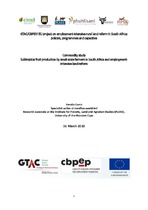Subtropical fruit production by small-scale farmers in South Africa and employment-intensive land reform
Abstract
The subtropical fruit and nut sub-sectors of South Africa are among the fastest growing agricultural sectors in the country. Growth in these sub-sectors is driven by export demand and high prices, which in turn drive innovation and productivity. Together with citrus fruit, deciduous fruit and table grapes, subtropical fruit and nuts are considered ‘winners’ in terms of job creation and growth potential by the National Development Plan (NDP).
While most of the fruit volume and monetary value are produced by large-scale white commercial farmers, significant numbers of small-scale black farmers are growing subtropical fruit and nuts for a variety of purposes and value chains, most often for household food security and local informal markets. Many small-scale black commercial farmers also sell in tight value chains. Research shows that smallholder farmers are differentiated by the focus and scale of production, assets owned, access to markets, capital and other livelihood strategies.
Opportunities to expand the production of subtropical fruit and nuts by smallholder farmers do exist and are supported by their proven farming and marketing skills as well as organisational capabilities among them, a relatively well-functioning extension support system in some areas, a strong demand for subtropical fruit and macadamia nuts and the involvement of the industry bodies for subtropical fruit and nuts.
Constraints, such as access to land and water rights, access to capital for orchard expansion or the establishment of new orchards, inputs and infrastructure development, access to markets and infrastructure challenges may hamper the realisation of these opportunities.

